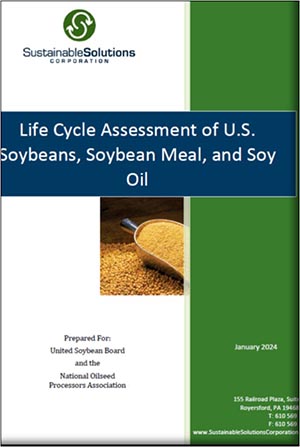Life Cycle Assessment
 A Life Cycle Assessment (LCA) jointly commissioned by NOPA and the United Soybean Board (USB) shows the carbon footprint for U.S. soybeans decreased 19 percent from 2015 – 2021.
A Life Cycle Assessment (LCA) jointly commissioned by NOPA and the United Soybean Board (USB) shows the carbon footprint for U.S. soybeans decreased 19 percent from 2015 – 2021.
KEY FINDINGS
The LCA found the U.S. soybean industry’s global warming potential (GWP) profile decreased considerably in 2021 compared to previously reported findings in 2015 and 2010:
- 19% per kg U.S. soybeans
- 6% per kg U.S. soybean meal
- 22% per kg U.S. crude soy oil
- 8% per kg U.S refined soy oil from co-located processing facilities and refineries.
The main drivers of environmental impact assessed in the LCA included soybean cultivation and harvesting (e.g. herbicides, field operations and fertilizer), transportation and energy usage in processing.
Factors contributing to a decrease in global warming potential, include:
- Land Management: Improving soil health and water quality.
- Land Efficiency: Advances and improvements in seed quality have contributed to a 24% increase in yields since 2015.
- Pesticide Application and Energy Consumption: Changing farming practices, such as decreased chemical application, implementation of no till and expanded cover crops.
- Manufacturing: Improving technologies and efficiencies at oilseed processing
operations, such as switching from coal to natural gas fuel sources.
READ MORE
- Press Release: Life Cycle Assessment Shows U.S. Soy’s Carbon Footprint Has Considerably Decreased
- Fact Sheet: U.S. Soybeans, Soybean Meal, and Soy Oil Life Cycle Assessment Fact Sheet – Sustainability
- Infographic: Reduced Global Warming Potential
- Op-ed: Opinion: Decreased Carbon Footprint Brings New Opportunities for Homegrown U.S. Soy by Lucas Lentsch (USB) and Kailee Tkacz Buller (NOPA)

